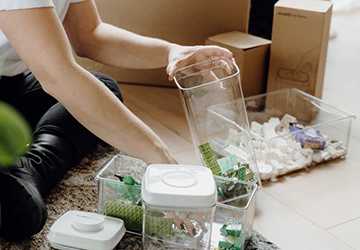The Art of Decluttering: Simplify Your Life and Reduce Stress
Author: noumankhan
Clutter means gathering many unnecessary things in our life that are problematic. In this quick-paced and consumer-driven society, chaos appears to assemble quickly. We accumulate unneeded goods in our homes, workplaces, and even our heads, which causes us to feel overwhelmed and stressed. Decluttering is an art that can help you live more simply and calmly, leading to a happy, healthier, and balanced lifestyle. This article will examine how decluttering can help you, the helpful advice for efficient decluttering, and how it may reduce your stress, leading to better mental and physical health.
Positive Outcomes Of Decluttering
Decluttering, or minimalism, is the art of eliminating unnecessary goods, thoughts, and relations from your life, leading to a sense of contentment and relaxation. It helps you to improve your organization tips by tidying up, which may help you to create a fixed place for everything you need. It saves you time searching for things when you are in a hurry. Sometimes, clutter can overburden your mind and heart, making it difficult to focus on essential items. Decluttering helps achieve mental clarity and settlement, which also helps in restful sleep and mental stability. When mentally clear and peaceful, you also deal well with people around you, leading to substantial and healthy bonds with others. You socialize better, and your communication skills also improve over time.

Practical Tips for Effective Decluttering
Following are the most effective and influential tips to start decluttering your life to simplify your life and help in stress reduction, leading to mental and emotional stability :
1.Clarify Your Objectives
First, you must start by making a checklist that clarifies your objectives or aims for decluttering your life, home, and workplace. It would help if you looked up all those unnecessary stuff that must be sorted out. After deciding on the context list, break down the process into parts and gradually start by making small steps. If you try to do everything quickly, you will make a mess and be frustrated early. Once you decide to declutter something, do not doubt it again, as unnecessary possessions only cause trouble and require space that should be given to something meaningful.
2.Cut Back On Your Commitments
Another way to minimalism is to reduce your commitments to those around you. Always choose quality over quantity. The number of friends doesn't matter; what matters is, do they bring you joy? Make commitments to those you want close to you in your hour of need that help you clear your mind and make you happy. Learn to say no to unnecessary people as your time is limited; spend it on people who matter. Please write down the names of everyone in your life and reconsider who deserves your time and has a value that makes it easy to declutter from your life.
3.Review your daily schedule.
Decluttering might initially seem frustrating, but you can reach your target if you start taking small steps. It begins by reviewing your daily schedule. Learn to eliminate unnecessary things from your routine and use your time well. Always add an early and refreshing morning with a good night's sleep in your way, no matter how busy you are, as your sleep directly impacts your mental and physical health. Reduce the tasks smartly by making a section of similar jobs and dividing other tasks into more categories to complete within seven days a week. Try to make short-term realistic goals that can be achieved without any difficulty. It helps in organizing your work and leads to stress reduction.

4.Regular Tidying Up Of Your Workplace And Home
Tidying up your workplace and home is essential to start your day or work with a relaxed and refreshed mind. Start by removing all the unnecessary goods from your place like waste papers, glasses, food, broken goods, etc. Then, start clearing dust from your desks, chairs, cupboards, and other furniture. After this, you need to organize everything left in the room that should be arranged smartly in the given space. Make space for essential items and throw out the rest. It will reduce your stress and save time for finding things in their place among the unnecessary stuff.
5.Avoid Getting Emotional
One of the critical factors to consider while decluttering things and people from your life is to stop getting emotional over this unnecessary stuff, as it needs to be decluttered timely. Do not doubt your decisions, and avoid getting too attached to things and people that are not worth it.
Always be passionate about your possessions, as nothing lasts forever, whether an item or a person. Emotional attachments always lead to disastrous and heartbroken endings. Try to be realistic in your relations and extensions to sort them out quickly. In the end, decluttering always favors you in your mind, leading to stress reduction and emotional stability.
6.Disconnect and relax.
One of the most effective ways to reduce stress and anxiety levels to lead a happy life is to take breaks from constant struggles, work, and worries. Unplug your devices and reduce your screen time. Make time for more healthy activities like walking, chatting with a friend, spending time in nature, meditation, yoga, exercise, etc. Take naps during the day, listen to soft music or read a light book before bed, get up early in the morning, and have a fully nutritional meal. These activities will help you stay calm and relaxed, and your priorities will shift to healthier habits rather than unnecessary worldly attachments, leading to intelligent minimalism.
Conclusion
Despite organizing spaces in your home, decluttering is an incredible method of simplifying your life and lowering stress. You can simplify your living environments by establishing clear goals, organizing and categorizing, and using firm decision-making techniques. Always keep in mind that clutter-free surroundings equals a clutter-free mind.



